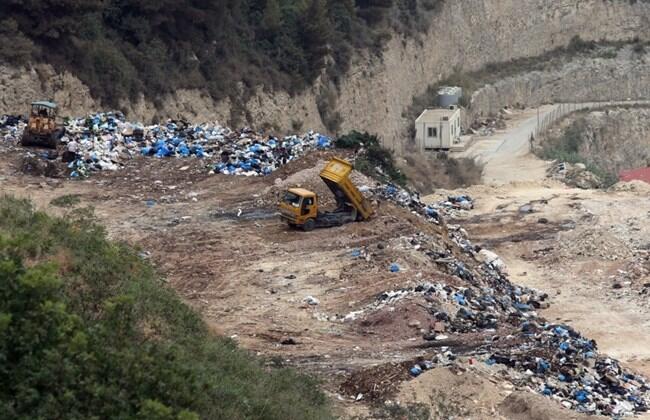The qada of Jbeil never subscribedto the services of Sukleen, thewaste management contractor for Beirut and the rest of Mount Lebanon. Instead, it marches to its own beat, with local governments collecting the trash and the union of municipalities maintaining a landfill within the territory, at Hbalin. The union is still structuring its contract with Batco, a multinational engineering firm that builds solid waste infrastructure. But when it is complete, the qada will be able to compost its organic waste and sell its recyclables. Together, these processes will keep costs down and minimize the volume of waste. From collection to street sweeping to composting to disposal, the union of municipalities will execute the whole waste management cycle for half the cost per ton that Sukleen charges, if not less. Each day, trucks carrying the qada’s trash scale the slopes of Mount Lebanon and deposit a cumulative 100 tons of it at the Hbalin landfill, hidden in a valley bend. There, a large, green building is supposed to sort the organic refuse from the recyclables from the rest, which is mostly inert material. “We remove all the plastic and metal and [recyclables], and we treat the organic materials – compost it, so it shrinks. Its volume should shrink by 80 percent. After we’ve decomposed it, then we landfill it, because it is inert and won’t emit gases or ignite,” Khalifeh said. Composting is essentially the accelerated process of natural organic decay. Not unlike how food left out wilts, rots and shrinks, composting yields material many times lighter and smaller than the original waste. And the product is not simply landfill – it can also be used as rich, agricultural fertilizer. “The compost we either give to farmers, or we use as the dirt to cover the landfill,” Khalifeh said. The recyclables that come out of sorting can be sold to the market. “There are well-known recycling firms. Selling will reduce your costs by at least 50 percent,” Khalifeh said. After separating out the organic waste and the recyclables, the landfill is left to bury just 10-20 percent of the original waste. And because this remainder does not decay, it is, relatively speaking, clean and safe. A well-managed landfill is not exactly a place to call home, but it should not pollute or ignite, and its smell should be reasonably contained. Sukleen charges $130 per ton for its services, according to a report by Sweep-Net, a Middle Eastern waste expertise network. The Union of Jbeil Municipalities expects to spend just $65 per ton for the same waste relief. “Altogether, garbage collection costs us about $25 per ton and sorting and composting $40 per ton,” Khalifeh said. But if the union sells its recyclables, the bill comes out even less. “If everything is working correctly, [waste management] won’t cost us more than $30 per ton,” Khalifeh said. Sukleen does not release its operations data, but the Sweep-Net report indicates that the company composts or recycles only a fifth of the Beirut and Mount Lebanon trash it collects. That means the two regions must find space to bury about 3,000 tons of waste per day. But 50 percent of Lebanon’s urban waste is organic, and a further 43 percent is paper, cardboard, plastic, metal, cans or glass, according to a 2010 Sweep-Net report. Much of this quantity – approaching 90 percent of the waste – can be eliminated, through the techniques Jbeil is pursuing now. That would considerably alleviate the pressure on the country’s many makeshift dumps and few sanitary landfills. After Beirut and Mount Lebanon dig themselves out of the current garbage crisis, the government’s long-term plan appears to be to incinerate the capital’s waste. “This is a decision the Cabinet took in 2010, and [the consulting firm] Ramboll is examining the possibilities,” Environment Minister Mohammad Machnouk said Tuesday. But Lebanese environmentalists strongly oppose incineration. They argue it is cheaper and safer to compost and recycle instead; incinerator ash can poison groundwater if not disposed properly. The capital may wish to look to Jbeil, instead. The qada’s solution, to recycle and compost, is clean and sustainable, and requires little space. Philip Issa| The Daily Star











